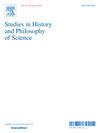个体化生态位:科学观念变迁的个案研究
IF 1.8
2区 哲学
Q1 HISTORY & PHILOSOPHY OF SCIENCE
引用次数: 0
摘要
本文以个体化生态位概念的发展为例,探讨了科学观念变化的原因和结果。我们概述了表征概念变化的框架,该框架区分了认知适应性和中性过程以及概念变化的结果。然后,我们应用这一框架来追踪个性化生态位概念是如何从人口生态位思维中历史地产生的,以及它如何在当代生物学研究计划中表现出多元性。虽然个体化生态位概念的发展是为了适应新的研究目标和实证结果,但它在当代研究中的一些多元化方面可能是中性的,即出于非认识论的原因。我们提出理由,认为这种多元性是没有问题的,并且可能变得有用,例如,当它允许概念应用于不同的研究背景时。本文章由计算机程序翻译,如有差异,请以英文原文为准。
The individualized niche: A case study in scientific conceptual change
We explore the causes and outcomes of scientific conceptual change using a case study of the development of the individualized niche concept. We outline a framework for characterizing conceptual change that distinguishes between epistemically adaptive and neutral processes and outcomes of conceptual change. We then apply this framework in tracing how the individualized niche concept arose historically out of population niche thinking and how it exhibits plurality within a contemporary biological research program. While the individualized niche concept was developed adaptively to suit new research goals and empirical findings, some of its pluralistic aspects in contemporary research may have arisen neutrally, that is, for non-epistemic reasons. We suggest reasons for thinking that this plurality is unproblematic and may become useful, for instance, when it allows for the concept to be applied across differing research contexts.
求助全文
通过发布文献求助,成功后即可免费获取论文全文。
去求助
来源期刊

Studies in History and Philosophy of Science
管理科学-科学史与科学哲学
CiteScore
2.50
自引率
10.00%
发文量
166
审稿时长
6.6 weeks
期刊介绍:
Studies in History and Philosophy of Science is devoted to the integrated study of the history, philosophy and sociology of the sciences. The editors encourage contributions both in the long-established areas of the history of the sciences and the philosophy of the sciences and in the topical areas of historiography of the sciences, the sciences in relation to gender, culture and society and the sciences in relation to arts. The Journal is international in scope and content and publishes papers from a wide range of countries and cultural traditions.
 求助内容:
求助内容: 应助结果提醒方式:
应助结果提醒方式:


